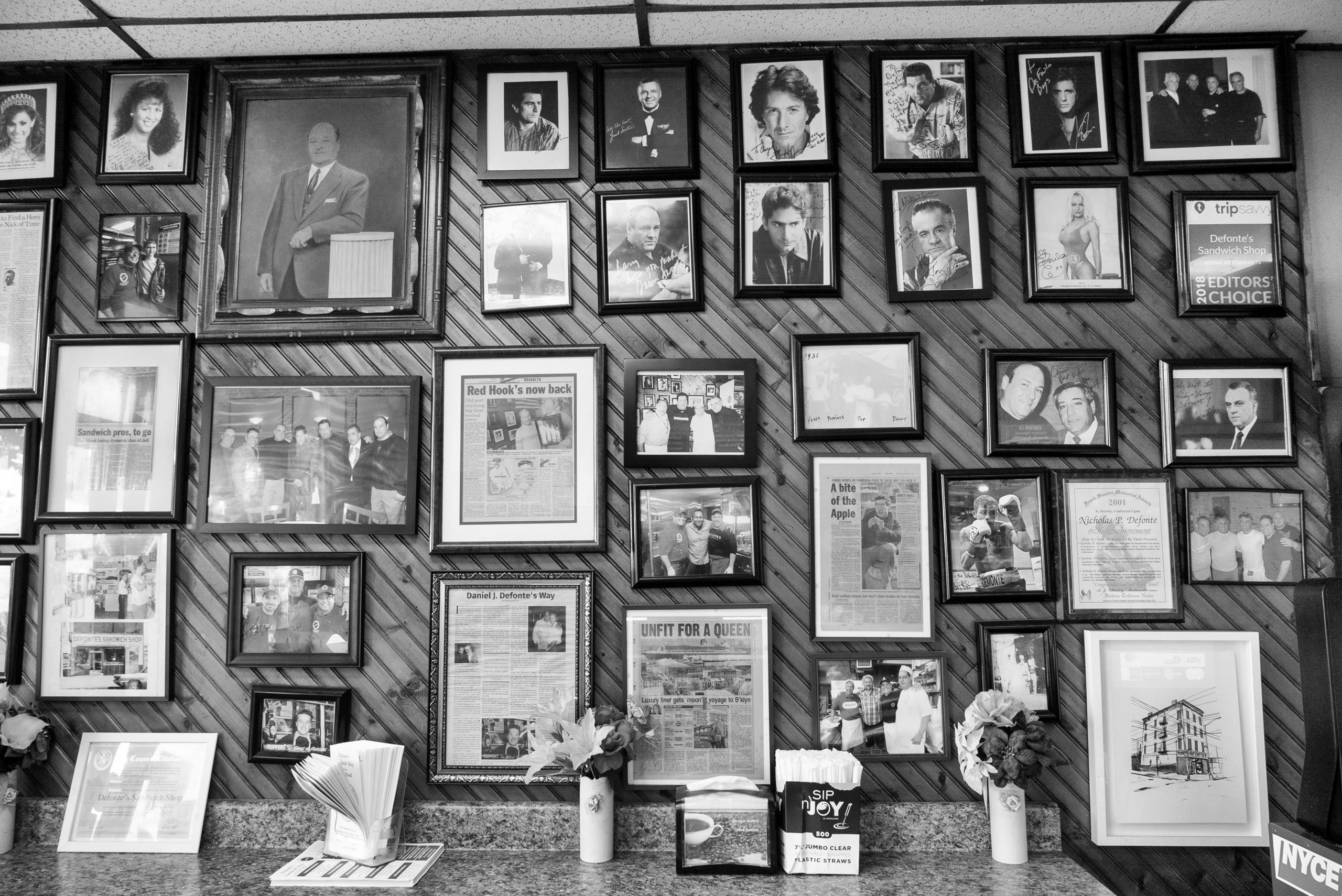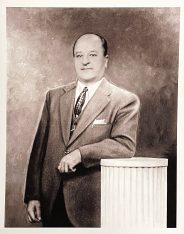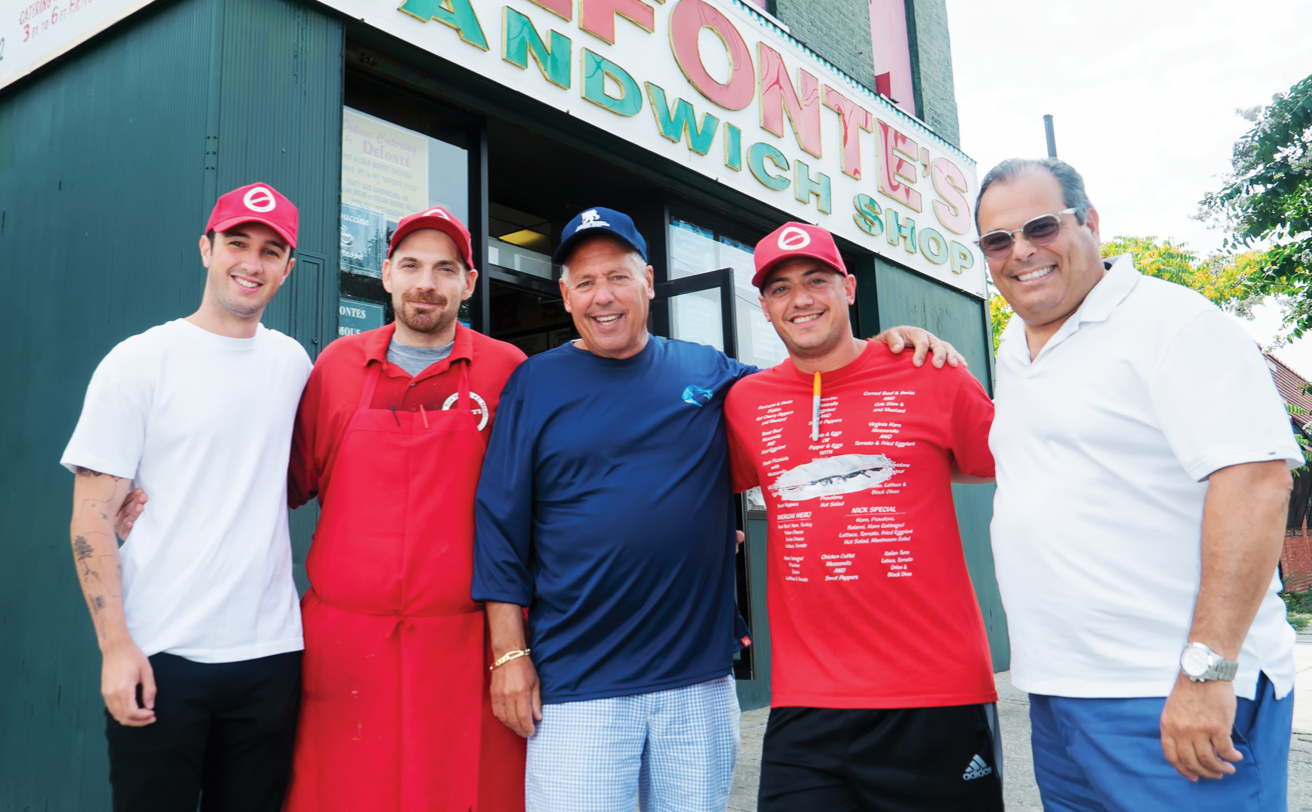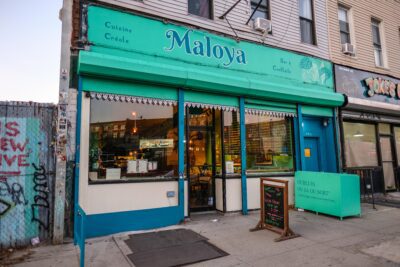Illustration by Christophe Marchand
Defonte’s won’t be throwing a party for its 100th birthday
It won't be going anywhere any time soon, either
On the corner of Columbia and Luquer Streets in Red Hook, just steps from the BQE, a thin three-story building stands out for its colors: mostly dark green, and on the boarded-up windows of the facade’s top three stories, a shade of what looks like pink.
The colors aren’t any kind of hip statement in an old port neighborhood that has rapidly gentrified over the past decade- plus — they are an homage to the green and red of the Italian flag. Signage on the ground floor provides the white to complete the tri-color theme and advertises Defonte’s Sandwich Shop — a small, otherwise inconspicuous store that turns 100 this year.
“It’s hard today. If it wasn’t for us owning the building, it’d be very stressful,” says Nicky Defonte, the 68-year-old patriarch of the family whose grandfather, Nick Defonte, started the shop in 1922. “You gotta work hard to be successful — and you need to be lucky. You need a little luck.”
First-time visitors are the ones in luck on this particular late-summer day. They might expect something a little more grandiose from an eatery that has outlasted the neighborhood’s longshoreman past and dangerous decline, defied health food trends and survived the Covid pandemic to become one of the oldest and most beloved institutions of its kind in all of New York City. But stepping inside reveals simplicity behind the concept, what the Defonte family says is the secret ingredient to the shop’s longevity.
It’s a weekday lunch rush. Several employees hover behind a long glass counter waiting to pick off the small crush of sweaty customers one by one. It’s a cash-only situation, and the only orderly line that forms is behind the ATM. One man who’s covered in construction gear and built like a linebacker orders roast beef with “mozzarelle.” A lanky 20-something in shorts with a long beard and sunglasses orders “Italian tuna” — a full 5-ounce can plopped on the crisp-on-the-outside-chewy-on-the- inside hero bread, with olives, onions and tomatoes. A family of four with two teenage daughters arrives in an Uber and lingers on their options while others waltz by them with regular orders in mind.
There is no fuss, no flash — except on the wall across from the counter, which is packed with signed photos of Italian-American celebs who have been customers, from Al Pacino to multiple stars of “The Sopranos.”
“We have so many different types of people that come into the store, from sanitation men, to cops, to lawyers, to FBI agents,” Defonte says. “We don’t dedicate ourselves or depend on just one type of person to come into the store.”
That wasn’t always the case.

Defonte’s Wall of Fame. Courtesy of Defonte’s
Brooklyn came to Defonte
The shop began as the equivalent of what Brooklynites would today call a bodega, catering mostly to the longshoremen who worked long hours on the Red Hook docks and who would stop by for coffee, snacks and groceries. Nick Defonte was one of them, and he became friendly with the shop’s owner, who, according to family legend, went by the nickname Brooklyn.
The legend continues that one day Brooklyn came to Defonte begging for help after getting into trouble with some local wise guys. He wanted to sell Defonte the building — for $100 or $300, depending on which family member you ask — before getting out of town.
Nick obliged, and when a worker later showed up asking for a sandwich, Nick obliged him too. Nicky Defonte, his grandson, thinks that the first Defonte’s sandwich was a simple ham and cheese, with lettuce and tomato — and, crucially, no mayo. Just olive oil.


An undated photo of Nick Defonte, who started the store in 1922. Courtesy of Defonte’s
“He didn’t believe in mayonnaise,” Defonte says. “Only thing he believed in was ‘soak it up in oil.’”
Speaking of oil, 1922 was also the year that the Teapot Dome bribery scandal ripped through Washington. President Warren G. Harding, an Ohio Republican, had just introduced the first radio to the White House and actress Betty White (may her memory be a blessing) was born in Oak Park, Illinois. Closer to home, construction of Yankee Stadium was underway in the Bronx.
And Nick Defonte’s sandwiches were an instant hit with the dockworkers. So he leaned in.
Fast-forward a couple of decades, and additions to the menu began to appear — from a famous layered egg, cheese and potato combination to lightly battered fried eggplants, which still show up in a variety of sandwiches (including in the Nicky Special, alongside ham, provolone, capicola, tomatoes, mushrooms and a “hot salad” of cucumbers, celery
and jardiniere).
Red Hook in the early to mid parts of the 20th century became known as a hotbed of crime and corruption synonymous with the likes of a young Al Capone and the movie “On the Waterfront.” But people came from all over the borough and beyond for the rich, thick heroes that knocked out hunger like DeNiro in “Raging Bull.”
“A lot, a lot, a lot of kids take the family business over and then destroy it. We took it to the next level,” Nicky says, referring to his father, his uncles and himself.
This is a put-your-head-down-and-work family with no excuses or sick days. Consistency is key. Nicky hated getting up at 5 a.m. to head to work with his father, his uncle Vito and several cousins, but he did it most days of the week starting in young adulthood. He remembers when a Defonte’s sandwich was 65 cents. By the 1970s, he says, it was $1.25.
“As a kid, when you knew that your friends were at the beach, hanging out, this and that, it’s a tough thing to swallow,” Defonte says. “But we worked, and every bit of money that we worked for, we earned.”
Billy Durney, the founder of Hometown Bar-B-Que in Red Hook — which has become a recent neighborhood institution in its own right — has been eating Defonte’s sandwiches for over 30 years, since he was a teenager growing up in East Flatbush. Even by subway, the shop isn’t easy to get to, a 15-minute walk from the nearest station, and Durney notes that the neighborhood’s dangerous reputation kept many people away. But he and some friends who liked to “freestyle BMX bike” around would regularly make the 40-minute trek.
The sandwiches, he says, still taste exactly the same.
“It feels like a time machine. It’s the same tile, the same counter. Nothing has ever changed,” he says. “The macaroni salad, the potato salad, the stuffed peppers — everything’s where it was 20 years ago, 30 years ago, it’s just unbelievable.”
That’s in part because they have used many of the same suppliers for decades — such as Kings Highway Bakery (itself a fourth- generation family-owned business), which Defonte says the shop has relied on since at least the 1960s. And the family keeps the recipes and the way things are done in a vice grip, says Nicky’s son Vinny.
“People say it all the time: ‘What is your father still doing working … why doesn’t he just go there and pick up his money?’ It doesn’t work like that. That’s the difference between places that last 100 years and places that don’t,” says Vinny, who grew up working in the shop like his father and later led a short-lived Defonte’s outpost in Manhattan.
“My father is still there every day, still in the kitchen, making sure the guys are doing it the way he wants it done,” he continues. “Because you know, [many of the workers] have been there 25 years, but you know, you give them free range and little by little they might just do one little thing that they liked better, and then the next thing you know, it’s not the same product. It’s not anything against them, it’s just the way it is.”
That doesn’t mean employees feel overly restricted. Their retention is very high — Vinny says the newest employee started “within the past five years,” before the pandemic. Some have been there for decades.


An undated photo of the storefront. Courtesy of Defonte’s
“With the consistency of all the things they do as far as the food is concerned, I really think maybe their greatest accomplishment is their retention of all these amazing, unique people,” says Durney. “I would say the retention rate is somewhere in the crazy rarefied air of like 90 to 95 percent [for 10 years or more] — which, if you think about that, in today’s day and age is absolutely ridiculous.”
Like so many other people and businesses in the area, the family has been approached by real estate developers offering millions of dollars for the valuable piece of property. Nicky has a quick answer to why he hasn’t sold yet.
“I still got great workers. You don’t just want to put them out,” he says. “You want to treat people good, you want to care about people. It’s not always about dollars and cents.”
Vinny says that the family has been on the same page about not selling, so far. But Vinny is a firefighter living on Staten Island now (where his father lives, too), and although he still regularly stops by the shop, he and his two siblings — a brother who works in the city’s sanitation department and a sister who has two children and is soon moving to Florida with her family — are far less engaged in the business than they used to be.
“The way I look at it, there’s no rush for anything. I mean, property value is never going to really go down, so what’s the point of rushing?” he says. “My father still enjoys working, I still enjoy going to the store when the store is going good, so there’s no reason to go jump on anything. When my father decides he wants to retire, maybe that’s a different story.”
‘They’re heavy’
Frank Falcinelli and Frank Castronovo, cofounders of Frankie’s 457 and Frankie’s Spuntino, two popular Italian restaurants in nearby Carroll Gardens, see a new era in the area — so many who wanted to sell (or were forced to sell) their properties have done so by now. Those who remain will likely stick around for a long time.
“When we got there [two decades ago], it was like 80-20: 80 percent old-timers, 20 percent new people, interlopers. And now it’s 80-20 the other way,” Falcinelli says. “But when you have 20 percent old-timers — they stick out, you know? They’re heavy.”
Over the phone, Nicky sounds like he hadn’t even realized this year was the shop’s 100th. There are no parties planned. He doesn’t point to any specific moments that he may have seen as high points from over the years — instead, he repeatedly says the esteem that customers show his family is the highlight for him.
“There’s so many things about the store that I forget about. Not forget about — you just don’t think of how special that store is,” he says. “The store’s got so much history, it’s freaking amazing.”


From left: Vincent Defonte, Ray Rotondi, Nicky Defonte, Vinny Defonte, Larry Demonte (Photo by David Doobinin)
You might also like 


























